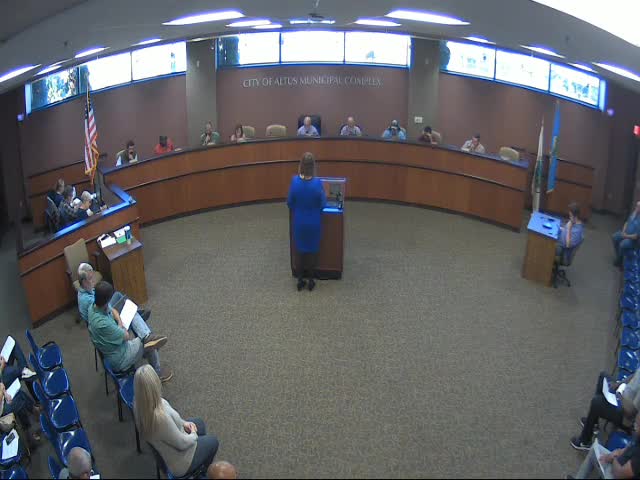Altus council adopts ordinance clarifying 4% lodging tax to include short-term stays; crash-pad owners press concerns
Get AI-powered insights, summaries, and transcripts
Subscribe
Summary
The Altus City Council voted to adopt Ordinance 2025-18, clarifying that the city—s 4% lodging tax applies to short-term stay facilities including hotels, motels, vacation rentals and crash pads, after extensive public comment and legal briefing.
The Altus City Council voted to adopt Ordinance 2025-18, a city code amendment that defines "short-term stay facility" and updates administration and penalties for the 4% lodging tax that voters approved. The ordinance passed after extended public comment and council debate; two members abstained on the final adoption vote and the council later approved an emergency clause to move the ordinance into effect sooner.
Jan Neufeld, city chief financial officer, told the council the ordinance is intended to clarify who is subject to the lodging tax approved by voters and to allow the city to administer the tax uniformly across hotels, motels, vacation rentals, crash pads and other short-term lodging. "These updates allow the city to fairly administer the tax approved by voters, ensure equity across lodging types, and provide the enforcement tools needed to keep the system fair and effective for everyone," Neufeld said.
Council members asked whether the change was procedural clarification or a substantive change to tax policy and whether the Oklahoma Tax Commission (OTC) would collect the 4%. The city attorney responded that the ordinance is a definitional clarification consistent with state statutory authorities cited during the hearing and that the OTC cannot collect the 4% in the city—s structure because of existing exemptions on the state portion. The attorney explained the city is not changing the tax rate or the ballot-directed use of revenues but is clarifying ordinance language to reflect what went to the voters.
During more than two hours of public comment, crash-pad operators and other short-term housing providers raised repeated concerns that the clarifying language could be applied in ways that would impose taxes on what operators consider long-term or quasi-permanent rentals. Speakers emphasized ambiguity about when a lodging arrangement counts as "temporary" and whether military personnel reimbursed on daily rates would be charged. One crash-pad owner said many operators are low-margin businesses and feared the change is "a stepping stone" to additional regulation; another noted some members of the public and former base commanders have expressed opposition to crash pads and asked council to be cautious.
City staff and the attorney said the ordinance includes an affidavit mechanism and exemptions tied to whether an occupant is reimbursed for temporary lodging; staff explained the practice would be to require a permit and regular filing and that non-filing penalties are added by a companion resolution. Staff also said the city would administer collection through the city clerk's office and that exemptions based on reimbursement or permanent residence would be evaluated per the ordinance and any supporting documentation.
After debate, the council voted to adopt the ordinance with packet pages 82 and 83 excluded from the adopted version. Councilmember Reister recorded an abstention on the adoption vote, and Mayor Garrison also abstained; other members voted yes. The council then approved the ordinance—s emergency clause in a separate vote, allowing the city to make the ordinance effective sooner. Staff indicated an effective-date target (discussed during the meeting) of November 1 for implementation and said the clerk's office would handle permits and collections going forward.
The council also adopted Resolution 2025-23 to add a fee to the centralized fee schedule addressing non-filing of lodging taxes; that resolution passed immediately after the ordinance emergency-clause vote.
What remains unresolved in practice is the operational detail: how the city will handle borderline cases (for example, residences rented for multiple months but billed on a daily rate, or occupants who choose not to change their official residence while staying in Altus), and how exemptions tied to reimbursements will be documented. Council members and staff said those implementation details will be administered by the clerk—s office and by permit/affidavit filings required of providers.
Speakers (selected): Jan Neufeld, CFO; City Attorney (legal briefing during hearing); Mayor Robert Garrison; Councilmembers; and multiple residents and crash-pad operators including Gina Wilson, Pete Sanchez and Henry Allen.
Why it matters: The ordinance formalizes how Altus will collect a voter-approved revenue stream intended to fund city priorities; it clarifies the legal scope to include modern lodging arrangements such as Airbnb/crash pads but leaves open operational questions that prompted strong public comment from local crash-pad operators and military community members.
